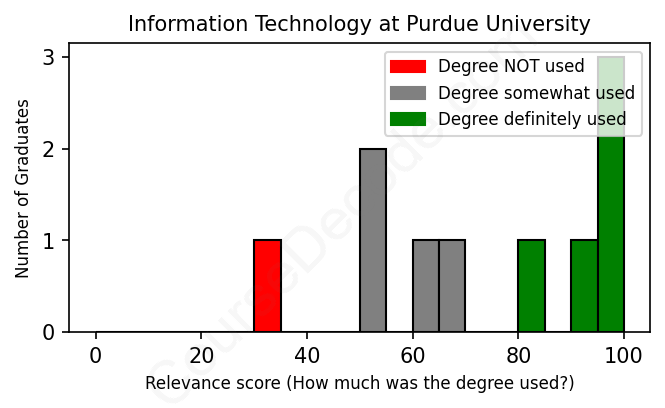
First, some facts. Of the Information Technology graduates from Purdue University we've analyzed , here's how many have used (or NOT used) their degree in their career:

These are estimates based on AI analysis of 10 LinkedIn profiles (see below).
The verdict? Above average. Overall, with an average relevance score of 73%, Information Technology graduates from Purdue University have a higher likelihood (+6%) of finding work in this field compared to the average graduate across all fields:
And for comparison, here's the chart for all profiles we've looked at across all degrees.
Also, after graduating, only 20% of these graduates have pursued further education other than another Bachelor's degree (such as a Masters degree or other), compared to the average across all profiles of 35%. This suggests a Bachelors degree is enough for most Information Technology graduates, and it's normal to look for work straight after graduation.
See the details:
|
Relevance score: 80% We think this person has gone into a career highly relevant to their degree. We think this person has gone into a career highly relevant to their degree.
DEGREE INFOGraduated in 2012 from Purdue University with a Bachelor's degree in Information Technology. No other secondary education since. JOB HISTORY SINCE GRADUATIONSharepoint Specialist ExxonMobil Jun 2012 - Jan 2014 Email Security Technical Lead and Supervisor  ExxonMobil Jan 2014 - Jan 2019 Productivity Solutions Supervisor  ExxonMobil Jan 2019 - Apr 2020 Service Management Supervisor  ExxonMobil May 2020 - Jan 2022 Software Security Solution Architect  ExxonMobil Jan 2022 - Present ABOUTNo information provided. |
The top 10 most common jobs done by the graduates we've analyzed (ranked most common to least) are:
When we look at the job roles taken up by Purdue University graduates with a degree in Information Technology, a few common themes emerge. Many graduates have landed positions in cybersecurity, software development, and IT service management. For instance, roles like Cyber Security Architect and Software Security Solution Architect require advanced knowledge in IT and cybersecurity, which align closely with what they studied. Similarly, positions like IT Support Services Analyst and IT Service Delivery Analyst emphasize the application of IT principles and practices, suggesting that these jobs are quite relevant to their education.
However, it's not all tech-heavy roles for everyone. Some graduates have ventured into positions like Operations Manager or even Superuser, where the connection to core IT knowledge is a bit loose. Plus, roles such as Classroom Supervisor or Veterinary IT Technician show that some graduates end up in positions that utilize very little of their IT education. Overall, while many graduates find jobs that relate directly to their Information Technology background, there are definitely a number who end up in roles that are only partially relevant or strayed away from pure tech positions altogether.
Here is a visual representation of the most common words in job titles for Information Technology graduates (this is across all Information Technology graduates we've analyzed, not just those who went to Purdue University):

Graduates from Purdue University with a degree in Information Technology seem to have solid career trajectories, especially when you take a look at their first jobs after graduating. Many of them step straight into roles that are relevant to IT, like SharePoint Specialist, IT Support Analyst, and Associate Software Engineer. This early start in the field allows them to build up their skills and gain valuable experience right out of the gate. It's not uncommon to see the fresh graduates moving up the ladder within a few years, landing roles such as Cyber Security Architect and Service Management Supervisor at well-known companies like ExxonMobil and others.
Fast forward five or ten years, and many of these Purdue alumni are navigating their careers in impressive ways. While some have taken on managerial or specialized roles, like Cyber Range Engineer or Data Architect, others have even ventured into entrepreneurship, starting their own companies. Although a few of the graduates seem to have taken a detour into unrelated fields or support roles, the majority are clearly thriving in careers connected to Information Technology. Overall, it looks like a degree from Purdue opens up some great opportunities in the IT world, and many graduates are finding success in areas they are passionate about.
Getting a Bachelor’s degree in Information Technology at Purdue University can be pretty challenging, especially if you’re not super into tech and coding. The coursework involves a fair bit of math, programming, and problem-solving, which can be tough if those aren't your strong suits. That said, if you have a passion for technology and are willing to put in the effort, you’ll probably find it rewarding rather than overwhelming. It’s about average in difficulty compared to other degrees, but the hands-on projects and labs can make it feel a bit more demanding at times. Just remember, staying organized and asking for help when you need it can make a big difference!
Most commonly, in the LinkedIn profiles we've looked at, it takes people 4 years to finish a Bachelor degree in Information Technology.
Looking at this lineup of Purdue IT grads, it seems like they've generally landed some solid gigs, which usually translates to decent pay, especially in tech. The grad from 2012 climbed the ranks at ExxonMobil, which is known for solid salaries, while the others also jumped around to various roles in cybersecurity and software engineering—fields that typically offer competitive salaries. Some, like the owner of BMGHosting, even started their own companies, which could be a lucrative move down the line. However, there are a couple of folks in more traditional roles or starting out in their careers who might not be raking it in just yet. Overall, though, it looks like most of them are on a good path to making decent money in the long run!
Here is a visual representation of the most common words seen in the "about" section of LinkedIn profiles who have a Bachelor degree in Information Technology (this is across all Information Technology graduates we've analyzed, not just those who went to Purdue University). This may or may not be useful:

Here are all colleges offering a Bachelor degree in Information Technology (ordered by the average relevance score of their Information Technology graduates, best to worst) where we have analyzed at least 10 of their graduates: